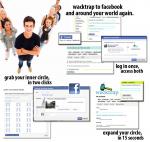What’s your story?
Share and find customer experiences
Connect with the people behind them
Wacktrap is
feedback made social
Trending Content
Sex Supposedly Sells Baby Carrots in Vending Machines as Junk Food
by hearit
The carrot industry—home of those “baby carrots” which don’t truly exist (at least in nature)—is betting many millions on the idea that all the advertising in the world will in fact sway the Cheetos and Doritos-eating crew to the world of carrots. 25 million, to be exact. After all, they’re all ‘orange’—why wouldn’t it work?
Crispin Porter’s throwing some sex into the mix—and results (supposedly) will follow. It only makes sense that America’s most virile age group is bound to make that switch from junk food to carrots—“baby” carrots, no less. What man wouldn’t be thrilled to be known for his vegetable-eating style, the epitome of “cool”—especially one with “baby” in its name? Crispin Porter + Bogusky, ad agency to the famous likes of fast-food chain Burger King and shoe giant Nike, has been given charge of instituting this ‘plot’.
The last laugh--in what seems slated for a carrot catastrophe-- may prove to be “at” the carrot industry, not “with” it—and will probably go to ad agency Crispin Porter + Bogusky: after all, there’s a cool 25 million involved. Yes, Crispin Porter + Bogusky was named Ad Agency of the Year in 2009. No, this year does not appear to include carrot industry work as some of its best.
The ads may become infamous but fame dubious, at best. The plot: a wedge in the shape of a carrot. Then there’s that ‘minor’ twist—the carrot industry and its ad agency seem to believe the new advertisements will successfully propel those babies, in their repackaged form, into school vending machines—and into the hands of the young crowd, who are sure to flock to those veggies in their new form. The main slogan appears to be “Eat ‘em like junk food.” Apparently this entire concept will work because, after all, changing the packaging matters: bags for the veggies—as a reintroduction—include new packaging that resembles those of Doritos brand chips—‘cause that’ll fool those ‘stupid’ kids into balancing their diets. Since America is so obviously founded on ideals of health, there’s no way that 25 million won’t be well-spent. There may well be some hazardous material happening with those vending machines—and some moldy, moldy “babies”.
It all seems a bit confusing: while part of the ‘plan’ includes placement of the carrots into vending machines, targeted to kids, the bulk of the ads tend toward the sexual. The world will be waiting—surely on pins and needles—for the TV ads, billboards and (surely engaging) phone apps and carrot video game that is slated to stun the nation one way or the other. Viewers can look forward to three distinct packaging options: one ‘couture’ looking package advertised with what can only be described as that akin to a phone sex operator voice, another which includes a shouting voice similar to a video game with announcements of “Baby! Carrots! Extreme!”. If neither of those two options suits the target audience and sex doesn't sell, there’s always a third option--apparently targeted to males in the less physically-dominated area of technology, synthesized voiceover included.
The majority of the new carrot industry ads appear to be targeted toward young men—obviously the target audience most likely to shift from junk food to a diet of baby carrots as snacks. Apparently, adding some sex and manliness to the concept of carrots will shift the whole industry—resulting in masses of young men who will now eat carrots instead of Doritos. That’s one possible scenario—the other is that any guy who currently eats carrots won’t go near one, at least not after the new ads are ‘deployed’. Dear carrot industry: you might have just killed your only market containing carrot-eating men.
As far as television ads, right now the most prevalent seems to be a sexually-based tv advertisement which includes a woman saying “oh, baby…carrots” in an ad with sound bites including “Feel that feeling; you know the feeling” and “overt sexual innuendo”. The syrupy, phone sex voice is a video clip preview worthy of some serious shudders and cringes—particularly considering one of the two main ‘players’ to be a carrot, a “baby” version no less. Some may view it as outright vegetable rape.
For the less physically inclined but more brainy bunch, there’s the nerdy “Chip and Abdul” series which pretty much defies explanation. The bizarre factor will supposedly stoke the fire—and tech geeks from far and wide will exchange the chips, which currently define their physical fitness, for baby carrots.
Perhaps the biggest ploy here (in “the joke’s one you, America” department) is the actual lack of existence of a “baby carrot”: that’s right, those little babies don’t really exist—not in nature anyway. Did someone forget to mention that fact? Oh, perhaps the carrot industry or Crispin Porter + Bogusky forgot to mention that “baby carrots” tend to head down a similar path as the Nauga, so popular only four decades ago. The Nauga, a “species” virtually created in the birth and marketing of the Naugahyde industry so prevalent in the 1970’s, is a lovable little creature. So lovable, and marketed so well, that part of America was fooled into believing in the Nauga’s existence—it only made sense, after all, since furniture was being manufactured from his “hide”.
Baby carrots are actually just regular carrots, peeled down into little nubs. They don’t exist, aren’t “real”—but their “existence” has been a fantastic marketing ploy, since most of the nation is completely unaware that those babies are just regular carrots in a trimmed format. Baby customers were actually created in the late 1980's as a way of saving excess with the regular-sized veggies. The trick's worked well, and most industries would marvel at the success of cutting waste while producing additional profits. Customers do get to pay more for baby carrots than ‘regular’ ones—a small price to pay for getting an even smaller end result out of the deal.
It may have only been a quick 13 months that Nike stayed with agency Crispin Porter, but apparently that time seems to have proven enough for the industry giant to assume that a vegetable and shoe should possibly be advertised in a similar vein. Those carrots, after all, are “extreme”—or that’s what the ads claim.
Be ashamed, Crispin Porter. Be very, very ashamed for the major #fail. For those afraid they’ll miss the upcoming features, the forthcoming carrot industry ads may be viewed at the attached link to the official site.
SPEED UP YOUR ONLINE GROWTH
How To Wack
Take the Tour
Click on any image to start












